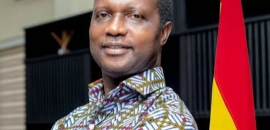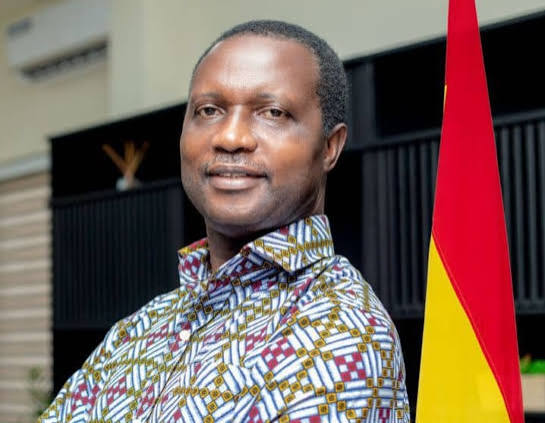
I will make University Education Free - Dr. Adutwum
Oct 20, 2025
by Chris Benyah Oct 20, 2025

October 20, 2025
Former Education Minister and Member of Parliament for Bosomtwe, Dr Yaw Osei Adutwum, has made a bold campaign promise to introduce free university education across Ghana if elected as president of the republic.
The announcement came as Dr Adutwum formally declared his candidacy for the New Patriotic Party's (NPP) presidential primaries, positioning himself as the candidate to expand Ghana's educational transformation to the tertiary level.
Speaking to party delegates and education stakeholders, Dr Adutwum framed his proposal as a natural progression of Ghana's educational reforms, arguing that financial constraints should not prevent talented young Ghanaians from accessing higher education.
"Education is the greatest equaliser, and no Ghanaian child should be denied the opportunity to attend university simply because of poverty," Dr Adutwum declared. "Under my leadership, tertiary education will not be a privilege for a few but a right for all."
The former Education Minister emphasized that his vision extends beyond mere access, aiming to create a knowledge-based economy capable of competing on the global stage.
Dr Adutwum outlined a phased approach to implementing the free university education policy, designed to ensure sustainability and maximize impact on national development priorities.
The implementation plan would begin with public universities, progressively expanding coverage as systems and funding mechanisms are established. A key feature of the strategy is the prioritization of science, technology, engineering, and mathematics (STEM) programmes, reflecting Dr Adutwum's longstanding commitment to technical and scientific education.
"We can achieve this if we manage our resources better and make education a true national priority," he stated, addressing concerns about the financial viability of such an ambitious programme.
To finance the free university education initiative, Dr Adutwum proposed a multi-pronged approach combining improved public resource management, enhanced revenue mobilization, and strategic private sector partnerships.
The former minister suggested that more efficient allocation of existing resources, coupled with Ghana's growing economy, could provide the foundation for sustainable funding of tertiary education without compromising other critical sectors.
His plan also envisions partnerships with private universities, technology companies, and international development partners to expand educational infrastructure and share the financial burden of universal tertiary education access.
Dr Adutwum positioned his free university education proposal as the logical next step following the successful implementation of the Free Senior High School (Free SHS) policy, which his administration helped to oversee and expand.
"Free university education will be the next bold step in continuing the legacy of the Free SHS policy," he said, drawing a direct line between the NPP's signature education initiative and his proposed expansion to the tertiary level.
The Free SHS programme, introduced in 2017, has significantly increased secondary school enrollment across Ghana, creating a larger pipeline of students seeking university admission. Critics and supporters alike acknowledge that this success has intensified pressure on tertiary institutions and raised questions about access and affordability at the university level.
Dr Adutwum's credentials as Education Minister provide substantial backing for his ambitious proposal. He is widely credited with advancing STEM education in Ghana through various initiatives including the establishment of STEM schools, curriculum reforms, and partnerships with technology companies.
During his tenure, the Education Ministry implemented programmes to increase female participation in STEM fields, upgraded science laboratories in schools nationwide, and introduced coding and robotics into the educational curriculum.
"Ghana's development depends on how well we invest in our human capital. I have the experience, the vision, and the will to make education truly transformative," Dr Adutwum asserted, citing his ministerial achievements as evidence of his capacity to deliver on educational promises.
Education policy experts suggest that free university education could have far-reaching implications for Ghana's economic development and social mobility.
Proponents argue that removing financial barriers to tertiary education would unlock human potential across all economic classes, potentially leading to increased innovation, entrepreneurship, and skilled workforce development.
Dr Kofi Asante, an education economist at the University of Ghana, noted that while the policy is ambitious, its success would depend heavily on implementation details. "The question isn't whether free university education is desirable—it clearly is—but whether it can be implemented without compromising quality and sustainability," he observed.
Dr Adutwum's announcement comes as the NPP prepares for its presidential primaries, with several prominent party members expected to contest for the opportunity to lead the party in future elections.
His focus on education policy distinguishes his candidacy, leveraging his ministerial experience and policy achievements as key selling points to party delegates and the broader electorate.
The promise of free university education is likely to resonate strongly with young voters and families struggling with the rising costs of tertiary education, potentially giving Dr Adutwum a distinctive platform in a crowded field of aspirants.
Despite the appeal of free university education, the proposal faces significant scrutiny regarding feasibility and fiscal responsibility.
Critics point to the financial pressures already facing Ghana's economy, including debt servicing obligations and competing demands for public resources in healthcare, infrastructure, and social services.
Questions also persist about the capacity of existing university infrastructure to accommodate expanded enrollment without compromising educational quality. Ghana's public universities already face challenges with overcrowding, inadequate facilities, and limited lecturer-to-student ratios.
Some education stakeholders have called for more detailed financial projections and implementation timelines before fully embracing the proposal, emphasizing the importance of learning from both successes and challenges of the Free SHS programme.
As Dr Adutwum campaigns for the NPP presidential nomination, his free university education pledge will undoubtedly feature prominently in party debates and public discourse about Ghana's educational future.
Whether this ambitious vision becomes reality will depend not only on his success in securing the party's nomination and potentially the presidency, but also on the development of robust implementation frameworks, sustainable funding mechanisms, and broad political support.
For now, Dr Adutwum's promise has injected renewed energy into national conversations about educational access, equity, and the role of government in ensuring that all Ghanaians, regardless of economic background, can pursue their academic aspirations to the highest levels.

Oct 20, 2025

Oct 27, 2025

Sep 21, 2025